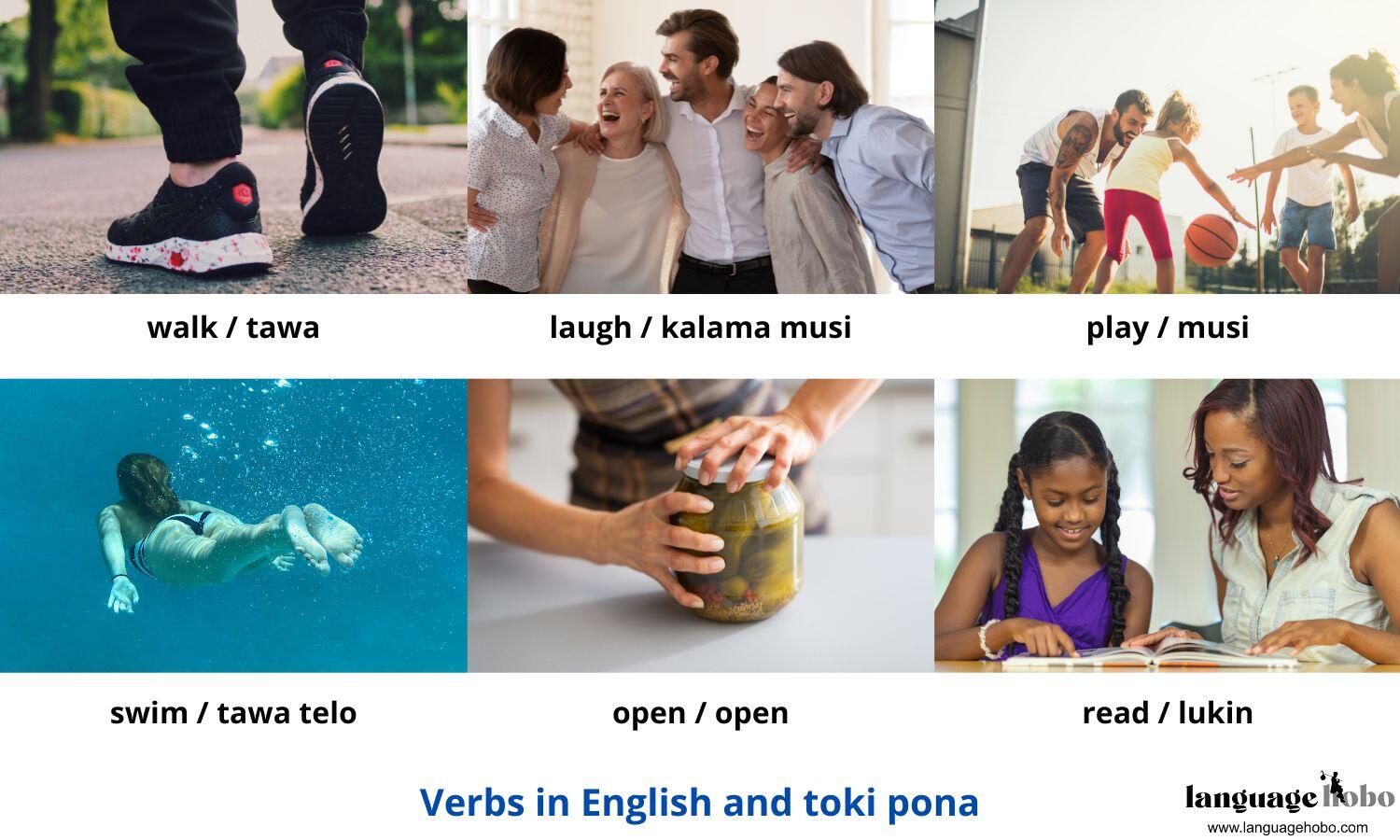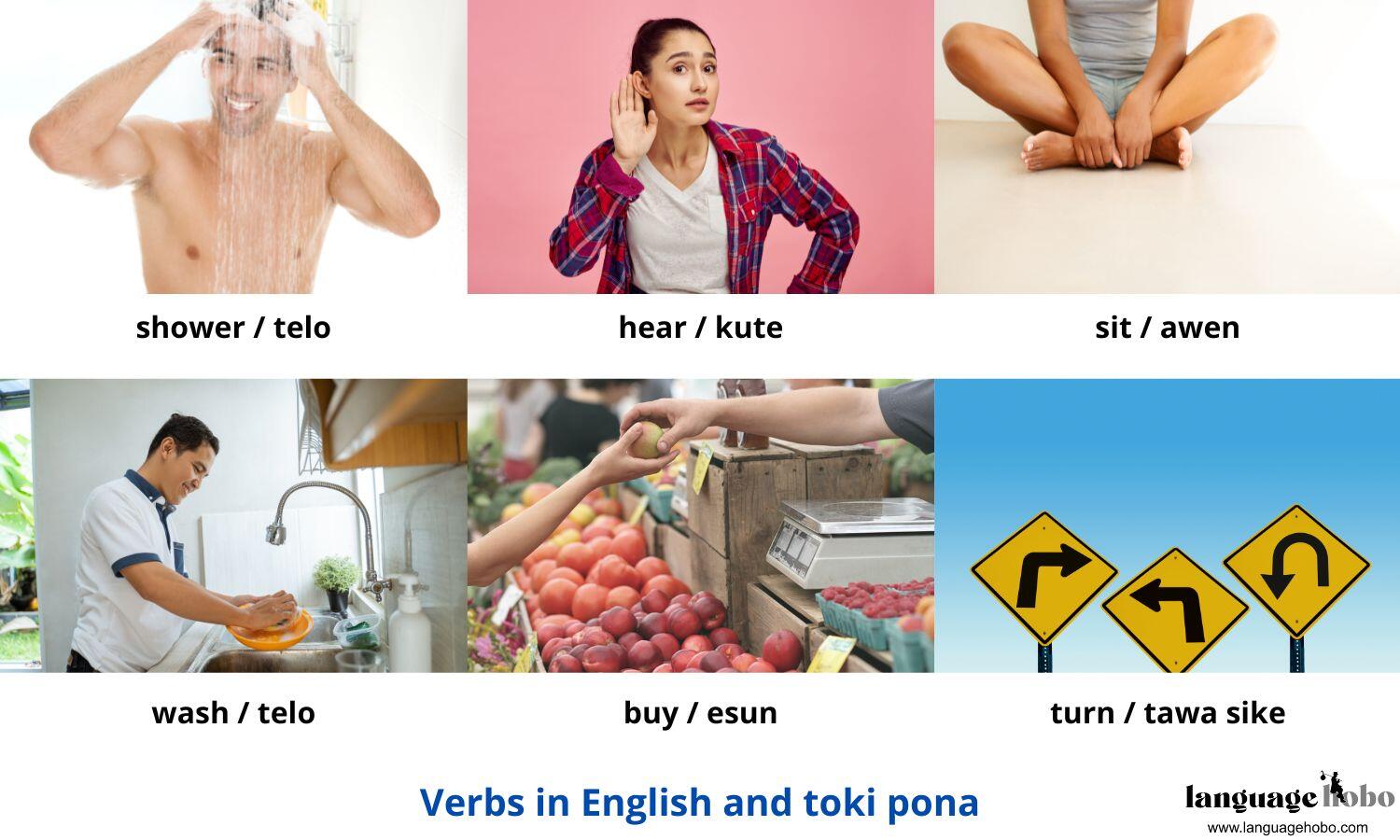The 82 Most Common Verbs In Toki Pona (With Pictures)
Learning verbs is important for any language, as you won’t really be able to do much without them.
Verbs (nimi pali) can, however, be tricky in toki pona. This is because there are only 125 root words in the language, and many of these have multiple meanings. Add to that the lack of consensus on which verbs to use in a given sentence, and you’ve got a recipe for confusion.
That’s why we’ve taken this collection of verbs from the official Toki Pona Dictionary, compiled by the language’s creator, Sonja Lang. This comprehensive dictionary gives each entry a score to signify how commonly used it is compared with its synonyms.
Our list includes the translations with the highest scores, so you can rest assured that you’re always using the most popular word.
You might also be interested in our FREE Toki Pona Audio and Picture Dictionary app for Android:
How do verbs work in toki pona?
toki pona has a simple grammatical structure, based on a small number of root words. Each word can have multiple meanings, depending on how and where it’s used in a sentence, and almost all words can be used as verbs, nouns, adjectives, and adverbs.
For example, “moku” can mean both “to eat” and “food”.
While this can be slightly confusing when you first start learning the language, it’s actually quite straightforward once you get used to it. In most cases, the meaning of a word is clear from the context in which it’s used.
toki pona verb conjugation
The good news is, verbs in toki pona aren’t conjugated, so you don’t need to worry about changing the ending of a word to indicate tense or person. What this means is that a verb will always have the same form, regardless of who is doing the action or when it’s happening.
For example, the verb “moku” can be used to mean “I eat/ate”, “you eat/ate”, etc.
So, now that you know how verbs work in toki pona, let’s take a look at some of the most common ones.
List of 82 Verbs in toki pona
toki pona Verbs 1 – 16

| Verbs 1 – 16 (English) | nimi pali 1 – 16 (toki pona) |
|---|---|
| be | lon |
| have | jo |
| do | pali |
| go | tawa |
| see | lukin |
| know | sona |
| like | pona tawa |
| want | wile |
| work | pali |
| come | kama |
| speak | toki |
| eat | moku |
| drink | moku |
| sleep | lape |
| live | lon |
| become | kama |
toki pona Verbs 17 – 32

| Verbs 17 – 32 (English) | nimi pali 17 – 32 (toki pona) |
|---|---|
| die | moli |
| leave | weka |
| stay | awen |
| return | kama sin |
| give | pana |
| take | kama jo |
| send | pana |
| make | pali |
| find | alasa |
| learn | kama sona |
| tell | toki |
| think | toki insa |
| believe | pilin |
| understand | sona |
| remember | awen sona |
| must | wile |
toki pona Verbs 33 – 48

| Verbs 33 – 48 (English) | nimi pali 33 – 48 (toki pona) |
|---|---|
| forget | weka sona |
| use | kepeken |
| need | wile |
| be able to (can) | ken |
| smile | pona uta |
| look | lukin |
| listen | kute |
| cost | mani |
| help | pana pona |
| cook | seli |
| love | olin |
| hope | wile |
| fear | pilin ike |
| cry | telo oko |
| drive | lawa e tomo tawa |
| sing | kalama musi |
toki pona Verbs 49 – 64

| Verbs 49 – 64 (English) | nimi pali 49 – 64 (toki pona) |
|---|---|
| walk | tawa |
| run | tawa wawa |
| play | musi |
| laugh | kalama musi |
| dance | tawa musi |
| swim | tawa telo |
| get | kama jo |
| read | lukin |
| open | open |
| close | pini |
| dream | sitelen lape |
| ask | wile sona |
| answer | toki |
| visit | tawa |
| feel | pilin |
| try | lukin |
toki pona Verbs 65 – 82

| Verbs 65 – 82 (English) | nimi pali 65 – 82 (toki pona) |
|---|---|
| shower | telo |
| wear | len |
| take off/remove | weka |
| put on (clothes) | len |
| buy | esun |
| put | pana |
| say | toki |
| hear | kute |
| sit | awen |
| stand | awen |
| turn | tawa sike |
| start | open |
| choose | wile |
| stop | pini |
| touch | luka |
| shout | toki wawa |
| write | sitelen |
| wash | telo |
If you’re interested in learning some more toki pona, check out our post Where to Learn Toki Pona.




